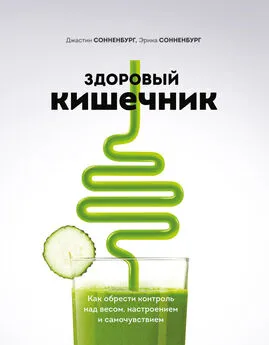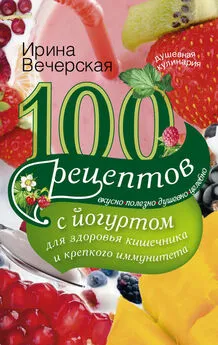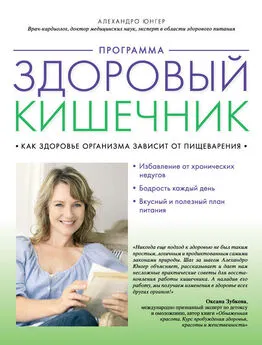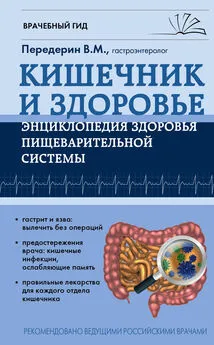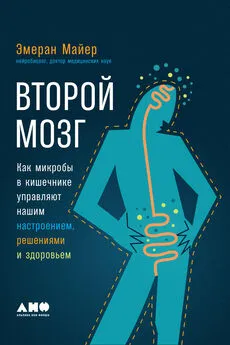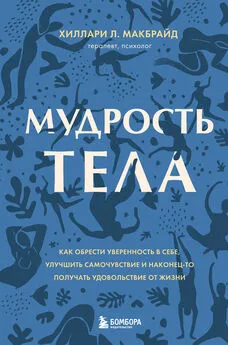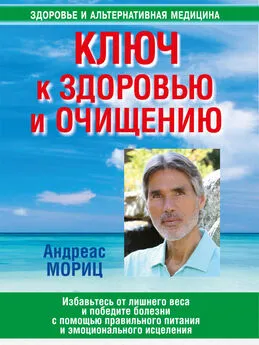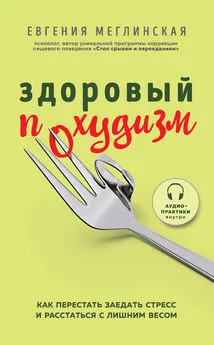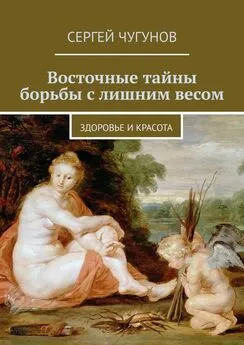Джастин Сонненбург - Здоровый кишечник. Как обрести контроль над весом, настроением и самочувствием
- Название:Здоровый кишечник. Как обрести контроль над весом, настроением и самочувствием
- Автор:
- Жанр:
- Издательство:Манн, Иванов и Фербер
- Год:2018
- Город:Москва
- ISBN:978-5-00117-564-3
- Рейтинг:
- Избранное:Добавить в избранное
-
Отзывы:
-
Ваша оценка:
Джастин Сонненбург - Здоровый кишечник. Как обрести контроль над весом, настроением и самочувствием краткое содержание
Здоровый кишечник. Как обрести контроль над весом, настроением и самочувствием - читать онлайн бесплатно ознакомительный отрывок
Интервал:
Закладка:
Wang, Z., et al. “Gut Flora Metabolism of Phosphatidylcholine Promotes Cardiovascular Disease”. Nature 472.7341 (2011): 57–63. Print.
Westenbrink, S., K. Brunt, and J. W. van der Kamp. “Dietary Fibre: Challenges in Production and Use of Food Composition Data”. Food Chem 140.3 (2013): 562–567. Print.
Wlasiuk, G., and D. Vercelli. “The Farm Effect, or, When, What and How a Farming Environment Protects from Asthma and Allergic Disease”. Curr Opin Allergy Clin Immunol 12.5 (2012): 461–466. Print.
Wolf, P. “Creativity and Chronic Disease. Vincent van Gogh (1853–1890)”. West J Med 175.5 (2001): 348. Print.
Yatsunenko, T., et al. “Human Gut Microbiome Viewed across Age and Geography”. Nature 486.7402 (2012): 222–227. Print.
Zhang, F., et al. “Should We Standardize the 1,700-Year-Old Fecal Microbiota Transplantation?” Am J Gastroenterol 1 07.11 (2012): 1755; author reply pp. 55–56. Print.
Сноски
1
Yatsunenko, T., et al. “Human Gut Microbiome Viewed across Age and Geography”. Nature 486.7402 (2012): 222–227. Print.
2
Consumer Expenditures in 2009. U. S. Department of Labor. U. S. Bureau of Labor Statistics. May 2011. Report 1028.
3
Исследования, в которых ни участники, ни ученые до конца эксперимента не знают, какая группа принимает плацебо, а какая – реальный препарат. Прим. науч. ред.
4
Robertson, K. L., et al. “Adaptation of the Black Yeast Wangiella Dermatitidis to Ionizing Radiation: Molecular and Cellular Mechanisms”. PLoS One 7.11 (2012): e48674. Print.
5
Schnorr, S. L., et al. “Gut Microbiome of the Hadza Hunter-Gatherers”. Nat Commun 5 (2014): 3654. Print.
6
Yatsunenko, T., et al. “Human Gut Microbiome Viewed across Age and Geography”. Nature 486.7402 (2012): 222–227. Print.
7
De Filippo, C., et al. “Impact of Diet in Shaping Gut Microbiota Revealed by a Comparative Study in Children from Europe and Rural Africa”. Proc Natl Acad Sci U S A 107.33 (2010): 14691–14696. Print. Lin, A., et al. “Distinct Distal Gut Microbiome Diversity and Composition in Healthy Children from Bangladesh and the United States”. PLoS One 8.1 (2013): e53838. Print.
8
Husnik, F., et al. “Horizontal Gene Transfer from Diverse Bacteria to an Insect Genome Enables a Tripartite Nested Mealybug Symbiosis”. Cell 153.7 (2013): 1567–1578. Print.
9
Thompson, J. D. “The Great Stench or the Fool’s Argument”. Yale J Biol Med 64.5 (1991): 529–541. Print.
10
Kendall, A. I. “The Bacteria of the Intestinal Tract of Man”. Science 42.1076 (1915): 209–212. Print.
11
Salyers, A. A., et al. “Fermentation of Mucin and Plant Polysaccharides by Strains of Bacteroides from the Human Colon”. Appl Environ Microbiol 33.2 (1977): 319–322. Print.
12
Финальная стадия процесса расшифровки генома, определение нуклеотидного ряда молекулы ДНК. Прим. ред.
13
Eckburg, P. B., et al. “Diversity of the Human Intestinal Microbial Flora”. Science 308.5728 (2005): 1635–1638. Print.
14
Backhed, F., et al. “The Gut Microbiota as an Environmental Factor That Regulates Fat Storage”. Proc Natl Acad Sci U S A 101.44 (2004): 15718–15723. Print.
15
Ley, R. E., et al. “Obesity Alters Gut Microbial Ecology”. Proc Natl Acad Sci U S A 102.31 (2005): 11070–11075. Print.
16
Turnbaugh, P. J., et al. “An Obesity-Associated Gut Microbiome with Increased Capacity for Energy Harvest”. Nature 444.7122 (2006): 1027–1031. Print.
17
Petersson, J., et al. “Importance and Regulation of the Colonic Mucus Barrier in a Mouse Model of Colitis”. Am J Physiol Gastrointest Liver Physiol 300.2 (2011): G327–G333. Print.
18
Dominguez-Bello, M. G., et al. “Delivery Mode Shapes the Acquisition and Structure of the Initial Microbiota across Multiple Body Habitats in Newborns”. Proc Natl Acad Sci U S A 107.26 (2010): 11971–11975. Print.
19
Lin, P. W., and B. J. Stoll. “Necrotising Enterocolitis”. Lancet 368.9543 (2006): 1271–1283. Print.
20
Claud, E. C., et al. “Bacterial Community Structure and Functional Contributions to Emergence of Health or Necrotizing Enterocolitis in Preterm Infants”. Microbiome 1.1 (2013): 20. Print.
21
Wang, Y., et al. “16S rRNA Gene-Based Analysis of Fecal Microbiota from Preterm Infants with and without Necrotizing Enterocolitis”. ISME J 3.8 (2009): 944–954. Print.
22
Alfaleh, K., and D. Bassler. “Probiotics for Prevention of Necrotizing Enterocolitis in Preterm Infants”. Cochrane Database Syst Rev. 1 (2008): Cd005496. Print.
23
Tarnow-Mordi, W., and R. F. Soll. “Probiotic Supplementation in Preterm Infants: It Is Time to Change Practice”. J Pediatr 164.5 (2014): 959–960. Print.
24
Название штамма бактерий и препарата БАД. Прим. науч. ред.
25
Koren, O., et al. “Host Remodeling of the Gut Microbiome and Metabolic Changes During Pregnancy”. Cell 150.3 (2012): 470–480. Print.
26
Palmer, C., et al. “Development of the Human Infant Intestinal Microbiota”. PLoS Biol 5.7 (2007): e177. Print.
27
De Filippo, C., et al. “Impact of Diet in Shaping Gut Microbiota Revealed by a Comparative Study in Children from Europe and Rural Africa”. Proc Natl Acad Sci U S A 107.33 (2010): 14691–14696. Print.
28
Marcobal, A., “Bacteroides in the Infant Gut Consume Milk Oligosaccharides via Mucus-Utilization Pathways”. Cell Host Microbe 10.5 (2011): 507–514. Print.
29
Cabrera-Rubio, R., et al. “The Human Milk Microbiome Changes over Lactation and Is Shaped by Maternal Weight and Mode of Delivery”. Am J Clin Nutr 96.3 (2012): 544–551. Print.
30
de Weerth, C., et al. “Intestinal Microbiota of Infants with Colic: Development and Specific Signatures”. Pediatrics 131.2 (2013): e550–е558. Print.
31
Koenig, J. E., et al. “Succession of Microbial Consortia in the Developing Infant Gut Microbiome”. Proc Natl Acad Sci U S A 108 Suppl 1 (2011): 4578–4585. Print.
32
Trasande, L., et al. “Infant Antibiotic Exposures and Early-Life Body Mass”. Int J Obes (Lond) 37.1 (2013): 16–23. Print. Hoskin-Parr, L., et al. “Antibiotic Exposure in the First Two Years of Life and Development of Asthma and Other Allergic Diseases by 7.5 Yr: A Dose-Dependent Relationship”. Pediatr Allergy Immunol 24.8 (2013): 762–771. Print.
33
Cho, I., et al. “Antibiotics in Early Life Alter the Murine Colonic Microbiome and Adiposity”. Nature 488.7413 (2012): 621–626. Print.
34
Trasande, L., et al. “Infant Antibiotic Exposures and Early-Life Body Mass”. Int J Obes (Lond) 37.1 (2013): 16–23. Print.
35
Lee, Y. K., et al. “Proinflammatory T-Cell Responses to Gut Microbiota Promote Experimental Autoimmune Encephalomyelitis”. Proc Natl Acad Sci U S A 108 Suppl 1 (2011): 4615–4622. Print.
36
Strachan, D. P. “Hay Fever, Hygiene, and Household Size”. Bmj 299.6710 (1989): 1259–1260. Print.
37
Wlasiuk, G., and D. Vercelli. “The Farm Effect, or, When, What and How a Farming Environment Protects from Asthma and Allergic Disease”. Curr Opin Allergy Clin Immunol 12.5 (2012): 461–466. Print.
38
Savage, J. H., et al. “Urinary Levels of Triclosan and Parabens Are Associated with Aeroallergen and Food Sensitization”. J Allergy Clin Immunol 130.2 (2012): 453–460. e7. Print.
39
Frieden, Thomas. “Antibiotic Resistance and the Threat to Public Health”. Energy and Commerce Subcommittee on Health 2010 of United States House of Representatives . Print.
40
Kozyrskyj, A. L., P. Ernst, and A. B. Becker. “Increased Risk of Childhood Asthma from Antibiotic Use in Early Life”. Chest 131.6 (2007): 1753–1759. Print.
41
Herbst, T., et al. “Dysregulation of Allergic Airway Inflammation in the Absence of Microbial Colonization”. Am J Respir Crit Care Med 184.2 (2011): 198–205. Print.
42
Olszak, T., et al. “Microbial Exposure During Early Life Has Persistent Effects on Natural Killer T Cell Function”. Science 336.6080 (2012): 489–493. Print.
43
Atarashi, K., et al. “Treg Induction by a Rationally Selected Mixture of Clostridia Strains from the Human Microbiota”. Nature 500.7461 (2013): 232–236. Print.
44
Smith, P. M., et al. “The Microbial Metabolites, Short-Chain Fatty Acids, Regulate Colonic Treg Homeostasis”. Science 341.6145 (2013): 569–573. Print.
45
Atherton, J. C., and M. J. Blaser. “Coadaptation of Helicobacter Pylori and Humans: Ancient History, Modern Implications”. J Clin Invest 119.9 (2009): 2475–2487. Print.
46
Song, S. J., et al. “Cohabiting Family Members Share Microbiota with One Another and with Their Dogs”. Elife 2 (2013): e00458. Print.
47
McGovern, P. E., et al. “Fermented Beverages of Pre- and Proto-Historic China”. Proc Natl Acad Sci U S A 101.51 (2004): 17593–17598. Print.
48
Мечников, И. И. Этюды оптимизма. М.: Главная редакция литературы на иностранных языках издательства «Наука», 1988.
49
Merenstein, D., et al. “Use of a Fermented Dairy Probiotic Drink Containing Lactobacillus Casei (DN-114 001) to Decrease the Rate of Illness in Kids: The Drink Study. A Patient-Oriented, Double-Blind, Cluster-Randomized, Placebo-Controlled, Clinical Trial”. Eur J Clin Nutr 64.7 (2010): 669–677. Print.
50
Allen, S. J., et al. “Probiotics for Treating Acute Infectious Diarrhoea”. Cochrane Database Syst Rev. 11 (2010): Cd003048. Print.
51
Hao, Q., et al. “Probiotics for Preventing Acute Upper Respiratory Tract Infections”. Cochrane Database Syst Rev. 9 (2011): Cd006895. Print.
Читать дальшеИнтервал:
Закладка:
